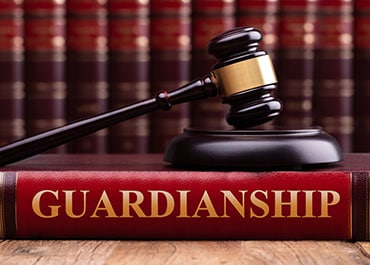Get Your Questions Answered – Call Me To Schedule Your 30 Minute Phone Consultation
(719) 985-8192

A guardianship is a legal arrangement where a court appoints someone to take care of a person who cannot manage their own daily needs. They generally apply to children and adults.
Even though children aren’t disabled in the commonly understood sense, they are considered legally unable to make decisions for themselves because they are not of legal age. Therefore, guardians are appointed to care for them.
Adults who can no longer take care of themselves due to medical or mental conditions may also need guardians. This includes those with severe illnesses, cognitive impairments, or other conditions that prevent them from managing their own affairs.
In both cases, guardians are responsible for ensuring the well-being of whoever they are responsible for, making decisions about their care, and managing their daily needs to that end.
Conservatorships usually go hand in hand with guardianships. A conservatorship is a legal arrangement where a court appoints someone to manage the financial affairs of a person who cannot handle their own finances. While a guardianship covers day-to-day care and decisions like medical care and education, a conservatorship focuses on managing money and financial matters.
Conservators handle all financial transactions, from paying bills to managing finances. For example, if a guardian decides a minor needs surgery, the conservator reviews and approves the payment to ensure it aligns with the guardianship terms. Conservators are also responsible for investing money wisely to make sure it lasts as long as possible.
People name guardians in their wills, but this isn’t the same thing as a court-appointed guardian. Despite the same word being used, these are two entirely different roles and sets of responsibilities.
If you’re appointing a guardian in your will, it can be whoever you feel has the time, ability, and financial resources to take care of your minor children. You would likely provide financial support for them, but sometimes that doesn’t cover everything. Ensure the chosen guardian is capable of handling all aspects of care for your children.
Court-appointed guardians and conservators, on the other hand, must meet some key requirements in order to be approved. Firstly, they must pass background checks. This includes checks with the Colorado Bureau of Investigation and the Federal Bureau of Investigation to ensure they have no disqualifying criminal history in their background.
The court also looks for signs of trustworthiness in candidates. Minor issues like traffic tickets usually won’t matter, but serious offenses like embezzlement could disqualify a candidate.
At the end of the day, guardians and conservators are considered fiduciaries, meaning they must act in the best interest of the person they are caring for. They must manage the person’s affairs responsibly and cannot use their position for personal gain whatsoever. Their actions can be reviewed by the court if there are concerns about whether they are acting in the person’s best interest.
Terminating a guardianship or conservatorship involves filing a motion with the court and demonstrating that the need for the arrangement no longer exists or that the protected person has passed away. Since guardianships and conservatorships are established by the court, they must also be terminated by the court. This is done through a legal process initiated by filing a motion.
To terminate adult guardianships and conservatorships, you must show that the protected person no longer needs the guardianship or conservatorship or that the person has passed away. This requires demonstrating to the court that the individual can now manage their own affairs or that the conditions requiring the guardianship or conservatorship have changed.
If the protected person has died, the guardianship or conservatorship can be terminated upon providing proof of death. In instances where the person under care is a minor, they can file a motion to terminate the guardianship when they reach adulthood.
For more information on Guardianships And Conservatorships, an initial consultation is your next best step. Get the information and legal answers you are seeking by calling (719) 985-8192 today.